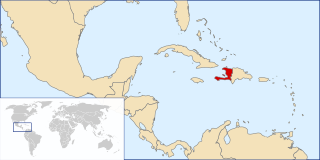This page is based on this
Wikipedia article Text is available under the
CC BY-SA 4.0 license; additional terms may apply.
Images, videos and audio are available under their respective licenses.
This article is about the demographic features of the population of Grenada, including population density, ethnicity, education level, health of the populace, economic status, religious affiliations and other aspects of the population.
Patois is speech or language that is considered nonstandard, although the term is not formally defined in linguistics. As such, patois can refer to pidgins, creoles, dialects, or vernaculars, but not commonly to jargon or slang, which are vocabulary-based forms of cant.

The term French West Indies or French Antilles refers to the seven territories currently under French sovereignty in the Antilles islands of the Caribbean:
Caribbean English dialects of the English language are spoken in the Caribbean and Liberia, most countries on the Caribbean coast of Central America, and Guyana and Suriname on the coast of South America. Caribbean English is influenced by the English-based Creole varieties spoken in the region, but they are not the same. In the Caribbean, there is a great deal of variation in the way English is spoken. Scholars generally agree that although the dialects themselves vary significantly in each of these countries, they primarily have roots in British English and West African languages. Caribbean English in countries with a majority Indian population like Trinidad and Tobago and Guyana has been influenced by Hindustani and other South Asian languages in addition to British English and West African languages.

Haitian Creole is a French-based creole language spoken by 10–12 million people worldwide, and the only language of most Haitians. It is a creole language based largely on 18th-century French with influences from Portuguese, Spanish, English, Taíno, and West African languages. Haitian Creole emerged from contact between French settlers and African slaves during the Atlantic slave trade in the French colony of Saint-Domingue. Haitians are the largest creole-speaking community in the world.
Antillean Creole is a French-based creole, which is primarily spoken in the Lesser Antilles. Its grammar and vocabulary include elements of Carib and African languages.
A French creole, or French-based creole language, is a creole language for which French is the lexifier. Most often this lexifier is not modern French but rather a 17th-century koiné of French from Paris, the French Atlantic harbors, and the nascent French colonies. French-based creole languages are spoken natively by millions of people worldwide, primarily in the Americas and on archipelagos throughout the Indian Ocean. This article also contains information on French pidgin languages, contact languages that lack native speakers.

Louisiana Creole people, are persons descended from the inhabitants of colonial Louisiana during the period of both French and Spanish rule. The term creole was originally used by French settlers to distinguish persons born in Louisiana from those born in the mother country or elsewhere. As in many other colonial societies around the world, creole was a term used to mean those who were "native-born", especially native-born Europeans such as the French and Spanish. It also came to be applied to African-descended slaves and Native Americans who were born in Louisiana. Louisiana Creoles share cultural ties such as the traditional use of the French and Louisiana Creole languages and predominant practice of Catholicism.
The Southern Caribbean is a group of islands that neighbor mainland South America in the West Indies. St. Lucia lies to the north of the region, Barbados in the east, Trinidad & Tobago at its southernmost point, and Aruba at the most westerly section.
Indo-Grenadians or Grenadians who trace their roots to India, form the largest minority group in Grenada. This term is not generally recognized by Grenadians or indeed Caribbeans. They usually refer to themselves simply as Grenadian or possibly Caribbean. This group was first introduced during the second half of the 19th century when Grenada experimented with indentured labour. By the second half of the 20th century Indians were so integrated into Grenada’s society that a distinct Indian cultural identity was generally invisible. In addition, Indians were involved in every aspect of Grenadian life. Currently there are over 12,000 Grenadians of Indian and mixed-Indian descent.

Grenada is a country in the West Indies in the Caribbean Sea at the southern end of the Grenadines island chain. Grenada consists of the island of Grenada itself plus six smaller islands which lie to the north of the main island. It is located northwest of Trinidad and Tobago, northeast of Venezuela and southwest of Saint Vincent and the Grenadines. Its size is 348.5 square kilometres (134.6 sq mi), and it had an estimated population of 107,317 in 2016. Its capital is St. George's. Grenada is also known as the "Island of Spice" due to its production of nutmeg and mace crops, of which it is one of the world's largest exporters. The national bird of Grenada is the critically endangered Grenada dove.
Saint Lucian Creole French(Kwéyòl)[kwejɔl], known locally as Patwa, is a French-based creole, which is the generally spoken language in Saint Lucia.
Grenadian Americans are Americans whose ancestry came from the Caribbean island of Grenada, or Grenadians who have American citizenship. Since 1984, nearly 850 Grenadians arrive legally in the United States each year, and the number of Grenadian Americans was 25,924 in 2000. They began immigrating to the US primarily from 1950. Between 2007 and 2011, there were approximately 30,320 Grenadian-born residents in the United States.
Dominican Creole French is a French-based creole, which is the generally spoken language in Dominica. It is highly mutually intelligible with its much more widely spoken immediate neighbor, Antillean Creole, of which it might be considered a distinct variety.
Windward Caribbean Creole English may refer to:



